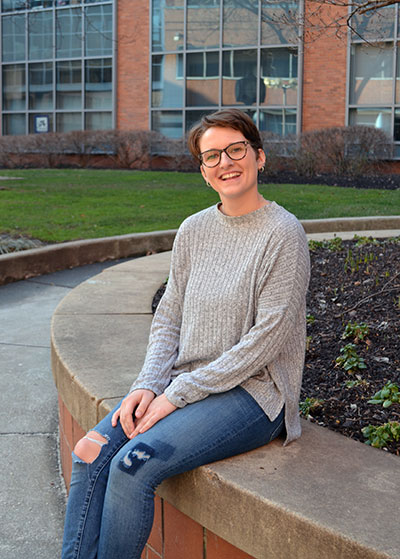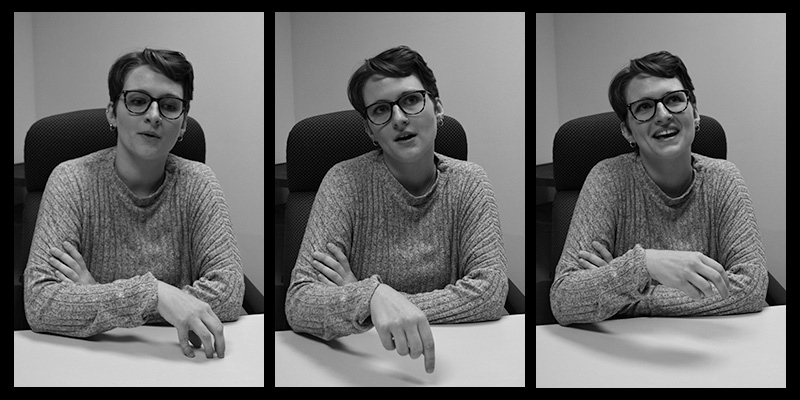
Savanna Michener
College of Engineering BS/MS student Savanna Michener has a down-to-earth quality that represents a new generation of peace workers—not starry-eyed hippies with good intentions, but deeply skilled pragmatists who want their STEM degrees to advance humanitarian goals in a crisis-ridden world.
Michener is Drexel’s—and arguably the nation’s—first peace engineer. She is enrolled in CoE’s 48-credit MS Peace Engineering program, launched earlier this spring.
As such, Michener gets to wear the mantle of “first.” She gets to combine her custom-designed MS in engineering with experiential peace work for the advanced degree. But first-in-line also means she is paving the way for others, helping faculty and advisors refine a program that is still recruiting its first cohort of students and enlarging its curriculum on the fly.
Which is where Michener’s pragmatism comes in handy.
“Right now, we’re still trying to finalize the details of the coursework since this is the first year the program has been run, and I am working with professors to provide feedback on the core curriculum. It’s been really interesting to engage with material that was co-created with peace professionals from our partner organization, the PeaceTech Lab in Washington, DC, and think about how to apply it in different engineering contexts.
“I want to add depth to the problems engineers are given. I don’t just want to be given these design scenarios and not understand the social, economic, political, and ethical ramifications of them,” said Michener. “I think the peace engineering program is a perfect, natural extension of my undergraduate degree.”
Concentrations to Suit All Engineers
The Peace Engineering program offers an expansive host of concentrations. Among them are water safety, systems management, data management and data mining, web and mobile development, machine learning and AI, serious gaming, interactivity, and systems analysis. The program is currently recruiting for the fall term. Advisors work closely with program enrollees to ensure a seamless blend of technical and peace-building skills.
Michener focuses her master’s degree on WASH, an acronym in the public health field that signifies studies in water access, sanitation, and hygiene. Under that designation, she’ll develop a skill set that enables her to work with communities in international settings. Some of the modalities she’ll learn are communications, systems modeling, risk assessment, negotiation, and conflict management.
“We need engineers who are ethical and competent and want to communicate and want to design holistic solutions. It needs to be a balance between the technical and the contextual.”
Savanna Michener, peace engineer
Michener also intends to serve as a spokesperson for the value of combining engineering and peace work in a society that doesn’t often see them combined. “I like doing this,” Michener said. “I’m used to being a guinea pig.”
The Peace Engineering program offers face-to-face classes with on-line courses in conjunction with PeaceTech Lab, a peacebuilding NGO headquartered in Washington, DC. Experiential learning through internships and co-ops here and abroad round out the degree.
Peace Engineering Program Co-Director Mira Olson, associate professor, CAEE, first met Michener two years ago while teaching an introductory engineering course.
“It was clear that Savanna was outstanding even then,” said Olson. “She had a global perspective and was already adept at pulling together ideas and concepts from different disciplines, which is critical in peace engineering. Her Custom Designed Major speaks to her ability to equip herself with the skills she’ll need to address complex issues.
“We’re happy to bring her into the realm of peace engineering and are lucky to have her help shape our program.”
Olson runs the program together with Co-Director James Tangorra, associate professor in the Department of Mechanical Engineering and Mechanics (MEM).
Changing Course in Haiti
Michener started at Drexel in 2014 pursuing a degree in biomedical engineering. Driven to use her education to improve lives, Michener initially thought that was the best route to achieving her goals. But an alternative spring break program in Port-au-Prince, Haiti convinced her otherwise. There, she met people doing international development work that, for the first time, sharpened into an ambition of her own.
“Through having conversations with people who were doing humanitarian aid and crisis work, and getting to know their backgrounds and histories in the field, I was exposed to a different kind of work,” said Michener. “It led me to understand more about international aid relief: why the earthquake affected them so much, how they were handling the effects, and the role outsiders played. I think it really opened my mind, and I came home and decided I really should do something I’m passionate about.”
Michener subsequently created a major in sustainable development through Drexel’s undergraduate Custom Designed Major program. Her individualized degree combines civil and environmental engineering, public health, and global studies.
It wasn’t until the fall of 2017—before she had decided to pursue a graduate degree—that Michener began hearing about the Peace Engineering program.
“I think the first Peace Engineering course I took was Conflict Management for Engineers. That was my introduction to the program,” said Michener. “I thought, this is really interesting and it really builds on my undergraduate major. I was like, I’m sold.”
From Michener’s point of view, the fundamental role of an engineer is to ensure the betterment of society and improve the lives of people through design and innovation.
But if the professionals in the field are not providing those services in proper context -- with the fullness of input from stakeholders on the ground and community-led solutions—then how, she asks, is that code being honored?

“I think the engineering field as a whole really needs to reevaluate what we’re doing and look at the big picture first and then break it down,” said Michener. “Obviously, technical expertise is important in so many situations, and we need more engineers to improve infrastructure. That’s our job, right?
“But we also need engineers who are ethical and competent and want to communicate and want to design holistic solutions. It needs to be a balance between the technical and the contextual.”
This summer, as part of her experiential learning requirement, Michener will be working with a WASH organization in a refugee camp in Lesvos, Greece. There, refugee camps originally constructed for 3,000 individuals have ballooned into holding cells with up to 10,000 people. Aid organizations are asking what can be done now to alleviate the conditions in the camps. Michener is eager to expand on her international experience and gain insights into addressing solutions on the ground.
In that context, she sees her technical degree as simply another set of contributive skills, like being a member of the military, or a policy wonk, or straight-out humanitarian workers. It’s just that engineering, in the past, hasn’t really had a seat at that table. Michener intends to give it one.
“I think it all starts with respect and openness. I think it can look different depending on the stakeholders involved but I really, I think that solutions should come from within,” said Michener. “If you’re an engineer who’s working in an outsider context, you might have technical skills that a community might need. But then, how do you bring those skills in-line with both what the community wants and needs?
“To me, that’s what this is all about.”